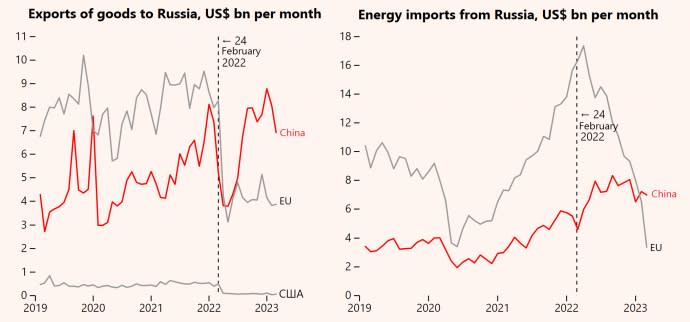How China has become Russia's leading supplier of weapons components
- Oops!Something went wrong.Please try again later.
China is neither fuelling the war nor profiting from it, says Xi Jinping. Ekonomichna Pravda proves the opposite.
"China will neither watch the fire from the other side, nor add fuel to the fire, let alone take advantage of the opportunity to make profits. Dialogue and negotiation are the only viable way out," Xi Jinping said following a telephone conversation with President Volodymyr Zelenskyy.
China's indifference to its own substantial economic losses in the first few months of Russia's invasion of Ukraine has surprised the world.
"Surging commodity prices have imposed significant costs on China, the world’s largest energy and agricultural importer – yet Beijing has never condemned the invasion, nor used its economic and political heft to pressure Moscow to the negotiating table", says Joseph Webster, a senior fellow at the Atlantic Council and editor of the China-Russia Report.
Time has proven that China has adapted and benefited. Despite Beijing's traditionally peaceful statements, open trade data shows that China is the primary economic beneficiary of the Russo-Ukrainian war.
How China profits
Unlike developed countries that have imposed sanctions on Russia, China's exports of goods to Russia have gradually recovered. In fact, export volumes in December 2022 and in February 2023 reached record levels not seen since 2019, according to open data recently published by the think tank Bruegel.
The export volume of goods supplied in each of the two months mentioned above was over US$9 billion, which is twice the monthly average over the past four years.
China's exports to Russia have increased, as have reverse imports of cheap oil

Energy imports from the Russian Federation to China are also setting records.
While the European Union was shaking off its dependence on Russian energy and, together with the United States, imposing a price cap on Russian oil, China began taking in more of the toxic but cheap resource after a temporary logistical slump.
Russian oil has been trading at a significant discount for several months. In particular, Urals, the traditional Russian brand, is 30% cheaper than Brent, the benchmark for the West.
Monthly energy imports from Russia (oil, oil products and gas) have risen to US$7-8 billion since the summer of 2022, which is more than twice the average monthly figure over the past four years.
This has enabled Russia to push Saudi Arabia off the top spot in the ranking of oil exporters. Bloomberg points out that the Russian Federation has also become the second largest source of coal supplies after Indonesia and the third largest supplier of liquefied natural gas after Australia and Qatar.
Bloomberg's latest "supply ranking" does not include the volume of gas transported overland, which China stopped reporting in early 2022.
How China is fuelling the war
In addition to profiting from it, Beijing has been actively fuelling the conflict by indirectly helping the Kremlin produce weapons. This includes supplying some crucial components to Russia, particularly microcircuits, chips, and electronics.
According to Bruegel (the latest data was published on 26 April 2023), in financial terms, supplies of the group of products which includes semiconductors are estimated at around US$500 million per month, which is several times higher than the average over the past four years.
However, they have not reached the record high seen in one month in 2021 when Moscow, evidently preparing for its future attack on Ukraine, was ramping up imports and stockpiling for the future.
Similar trends are observable in relation to telecommunications equipment, computers and other technology.
However, the February data suggests a decline in trade between the two countries compared to previous months of rapid growth. Could it be that China, previously a strong supporter of Russia, has changed its mind?
Russian imports from China of critical components needed to manufacture weapons

However, China is not the only country that should be charged with providing economic and material support to the Putin regime. As Ekonomichna Pravda has previously analysed, the Kremlin has set up parallel channels for importing sanctioned goods from Western countries.
For instance, Germany, which has officially reduced its direct electronics exports to Russia several times, increased its supplies to Armenia from US$0.5 million per month to US$4-6 million in 2022.
These goods were then shipped to the Russian Federation, contributing to a hundredfold increase in the volume of electronics supplied from Armenia in 2022 to US$100 million.
Data: Russian foreign trade tracker from Bruegel
Translation: Artem Yakymyshyn
Editing: Teresa Pearce

